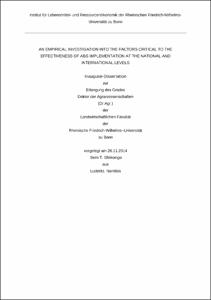Shikongo, Sem T.: An empirical Investigation into the factors critical to the effectiveness of ABS implementation at the national and international levels. - Bonn, 2015. - Dissertation, Rheinische Friedrich-Wilhelms-Universität Bonn.
Online-Ausgabe in bonndoc: https://nbn-resolving.org/urn:nbn:de:hbz:5n-40388
Online-Ausgabe in bonndoc: https://nbn-resolving.org/urn:nbn:de:hbz:5n-40388
@phdthesis{handle:20.500.11811/6248,
urn: https://nbn-resolving.org/urn:nbn:de:hbz:5n-40388,
author = {{Sem T. Shikongo}},
title = {An empirical Investigation into the factors critical to the effectiveness of ABS implementation at the national and international levels},
school = {Rheinische Friedrich-Wilhelms-Universität Bonn},
year = 2015,
month = jul,
note = {The research presented in this thesis firstly investigates critical factors for assessing the effectiveness of existing Access and Benefit Sharing (ABS) instruments at the national and international levels with respect to the effective implementation of the associated goals in line with Article 15 of the CBD. The analysis and identification of indicators for the critical factors took place within the theoretical framework of New Institutional Economics (NIE).
A global stakeholder survey on the necessary conditions for effective ABS instruments implementation confirmed the importance and validity of the theoretically derived critical factors and their indicators. Besides, it was confirmed that national ABS policy and implementation respond to dynamic internal and external factors like political pressure, changing market demand, new competitors, new scientific findings, technology innovations, criticism from NGOs, industry, media, governments as well as legal changes.
The study also looked at the question as to whether institutional learning was observed during the negotiation of the Nagoya Protocol. This was confirmed given that different innovative processes were used to transcend some of the blockages that blocked fluidity in negotiations and one can thus indeed speak of a significant learning process during the negotiations of the Nagoya Protocol. Based on the insights from the findings, a polycentric approach to ABS implementation is suggested, importantly involving both the private sector and indigenous and local communities if success is to be achieved.
A case study in Namibia showed that the identified critical factors and their indicators are indeed useful tools for assessing ABS implementation. It showed a clear progression over time in how the Namibian government had been dealing with ABS. This assessment of the effectiveness of Namibia’s approach to ABS implementation provides useful insights and lessons that could lead to improvements in ABS policy and implementation.},
url = {https://hdl.handle.net/20.500.11811/6248}
}
urn: https://nbn-resolving.org/urn:nbn:de:hbz:5n-40388,
author = {{Sem T. Shikongo}},
title = {An empirical Investigation into the factors critical to the effectiveness of ABS implementation at the national and international levels},
school = {Rheinische Friedrich-Wilhelms-Universität Bonn},
year = 2015,
month = jul,
note = {The research presented in this thesis firstly investigates critical factors for assessing the effectiveness of existing Access and Benefit Sharing (ABS) instruments at the national and international levels with respect to the effective implementation of the associated goals in line with Article 15 of the CBD. The analysis and identification of indicators for the critical factors took place within the theoretical framework of New Institutional Economics (NIE).
A global stakeholder survey on the necessary conditions for effective ABS instruments implementation confirmed the importance and validity of the theoretically derived critical factors and their indicators. Besides, it was confirmed that national ABS policy and implementation respond to dynamic internal and external factors like political pressure, changing market demand, new competitors, new scientific findings, technology innovations, criticism from NGOs, industry, media, governments as well as legal changes.
The study also looked at the question as to whether institutional learning was observed during the negotiation of the Nagoya Protocol. This was confirmed given that different innovative processes were used to transcend some of the blockages that blocked fluidity in negotiations and one can thus indeed speak of a significant learning process during the negotiations of the Nagoya Protocol. Based on the insights from the findings, a polycentric approach to ABS implementation is suggested, importantly involving both the private sector and indigenous and local communities if success is to be achieved.
A case study in Namibia showed that the identified critical factors and their indicators are indeed useful tools for assessing ABS implementation. It showed a clear progression over time in how the Namibian government had been dealing with ABS. This assessment of the effectiveness of Namibia’s approach to ABS implementation provides useful insights and lessons that could lead to improvements in ABS policy and implementation.},
url = {https://hdl.handle.net/20.500.11811/6248}
}






